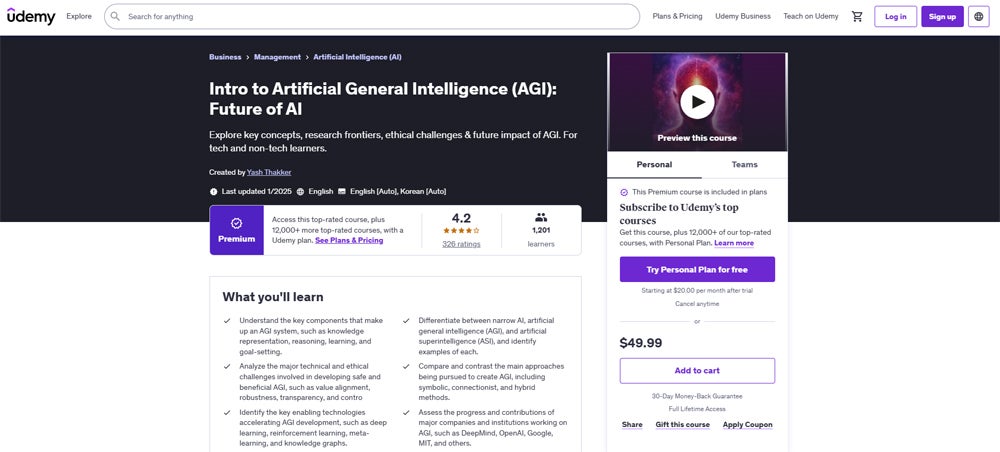What is artificial general intelligence (AGI), and why does it matter? As one of the most talked-about topics in technology today, it has sparked a race among top companies like OpenAI and Google to turn this cutting-edge concept into reality. Understanding AGI is important because it has the potential to revamp industries, affect our society in profound ways, and change the way we interact with technology. Here’s what you need to know about what it might be able to do, how it might transform industries and fields, and the significant challenges facing its development.
KEY TAKEAWAYS
- •AGI differs from traditional AI in key ways in that it would be able to think, learn on its own, and adapt to new challenges like humans unlike traditional AI, which is designed for specialized tasks and operates within a limited scope. It needs humans to update and refine abilities. (Jump to Section)
- •Once it becomes a reality, AGI would be able to make remarkable advances in several fields, including healthcare, research, and finance sectors. (Jump to Section)
- •Creating AGI is difficult due to the research challenges that include technical, ethical, and societal issues. Addressing these challenges is central to maintaining the safe and positive development of this technology. (Jump to Section)
Featured Partners: Artificial Intelligence Software
TABLE OF CONTENTS
What is Artificial General Intelligence (AGI): A Clear Definition
Artificial general intelligence, or AGI, refers to a type of artificial intelligence (AI) that can interpret, learn, and perform any cognitive task that a human can do. Unlike today’s AI, which is built to handle specific tasks like recommending products or processing data, AGI would be able to adapt to new challenges and apply knowledge across various fields. In other words, this advanced type of AI would think and reason like a human. While AGI holds great potential, it’s worth noting that it is still a concept today, with no fully developed systems available yet.
Key Capabilities of Artificial General Intelligence
AGI would have a range of capabilities that mimic human intellectual functions, so it can perform tasks beyond the narrow focus of the current AI tools in the market. Some key capabilities include the following:
- Human-Like Reasoning: The technology would be able to understand and make decisions the way humans do. It would think critically, solve problems, and come up with solutions based on its own experiences and past interactions, similar to how we apply past knowledge to new situations.
- Solving Unfamiliar Problems: One of AGI’s strengths is its potential to tackle new problems. Unlike traditional AI, which is trained to perform specific tasks, AGI would have the capacity to handle problems it hasn’t been directly trained to solve. It could figure out how to approach a completely new challenge, just like humans do when faced with something we’ve never encountered before.
- Self-Learning and Adapting: AGI could fine-tune its skills and learn from experience, without the need to be manually updated every time. It would observe and analyze data, learn from mistakes, and find better ways to complete tasks over time. This means AGI could adapt to new situations and get better at tasks on its own.
- Using Knowledge Across Different Areas: AGI would be able to take what it learns in one area and apply it to other tasks. For example, if it learned how to solve math problems, it could use that knowledge to address challenges in other fields, like science or business. The ability to transfer skills across different areas is something humans do naturally and would make the technology versatile in diverse sectors.
- Understanding and Responding to Emotions: Recognizing and reacting to human emotions would also be within AGI’s capabilities. This would be important in settings where understanding people’s feelings matters, such as healthcare, customer service, or social situations. By responding to emotions appropriately, AGI would be better equipped to work with humans in an effective way.
Understanding AGI vs Traditional AI
The table below provides a snapshot of the major differences between AI and traditional or narrow AI by underscoring their capabilities, adaptability, and current status.
AGI would have the ability to think, learn autonomously, and adapt to new challenges like humans. However, it is still theoretical and has not been realized yet. On the other hand, traditional AI is built for particular tasks and operates within a fixed scope. It cannot adjust to new tasks without human input.
For example, an AGI could learn to diagnose medical conditions, then use that knowledge to develop personalized treatment plans—and even adjust its approach based on the patient’s progress. Additionally, it could apply this problem-solving ability to tasks in completely different fields, such as creating business strategies or advising on environmental conservation. In contrast, traditional AI, like a diagnostic tool, can only analyze medical data for specific conditions. It cannot adapt to other areas or improve on its own.
Potential Applications of Artificial General Intelligence
While AGI isn’t here yet, its potential applications span numerous fields and hold great promise of drastic advancements in many sectors. Without being limited to specific tasks like narrow AI, AGI would be highly versatile and could apply its capabilities to solve multi-disciplinary problems. It could overcome challenges currently beyond the capabilities of existing AI applications.
Transforming Healthcare
AGI would change the game in healthcare by diagnosing complex and rare diseases with greater accuracy, even in cases where symptoms are ambiguous or overlap with multiple conditions. It could create highly personalized treatment plans by studying patient history, genetic information, and real-time health data. In addition, AGI could accelerate drug discovery, identifying possible treatments in weeks rather than years by processing massive datasets and running predictive simulations.
Advancing Scientific Research
In scientific research, AGI would be able to simulate experiments, analyze intricate datasets, and generate hypotheses. It could expedite breakthroughs in quantum physics, genomics, and climate science. By integrating knowledge from various domains, the technology could uncover connections and solutions that might otherwise go unnoticed by traditional AI.
Improving Industry
Organizations in the industrial field could use AGI to boost efficiency in real-time by managing entire supply chains. It would predict and resolve disruptions before they occur. In manufacturing, it could oversee autonomous factories, optimizing production processes while maintaining safety and quality standards. Its ability to adjust to changing circumstances would make it an invaluable tool in industrial environments.
Enhancing Business Strategy
AGI could improve business decision-making by evaluating market trends, customer behavior, and operational data to find opportunities and risks. In contrast to narrow AI systems, AGI would innovate solutions to challenging business problems, such as dealing with economic uncertainty or forecasting long-term market shifts. Its ability to learn from diverse sources would empower businesses to remain competitive.
Redefining Finance
In the financial sector, AGI could increase forecasting precision by detecting patterns in vast amounts of financial data, so investors and institutions can make informed decisions. It would also be able to spot fraud in real-time by recognizing subtle anomalies that traditional AI systems might miss. Additionally, AGI could build more robust financial models, factoring in complicated variables and scenarios to mitigate risks.
Challenges in Artificial General Intelligence Research
Developing AGI is one of the most ambitious goals in technology, but it comes with many difficulties. These challenges include technical, ethical, and societal areas, making AGI development an intricate and multi-faceted process. Overcoming the following challenges is tantamount to ensuring safety, upholding ethical standards, and carefully planning how AGI’s introduction and use will affect people, industries, and society as a whole:
- Making AGI Truly Flexible: AGI would need to handle a wide range of problems and adapt to new situations, just like humans. Building a system of flexibility is incredibly hard because current AI tools are not designed to think or learn at this level of sophistication.
- Massive Computing Needs: To replicate human intelligence, AGI would require enormous amounts of computing power to process information from diverse sources quickly. Figuring out how to make such systems powerful and efficient enough for real-world use is a substantial challenge.
- Understanding Human Intelligence: We don’t fully understand how human thinking works, especially complicated aspects like intuition or consciousness. Without this understanding, it’s challenging to build machines that can emulate human-like thinking.
- Making AGI Safe and Ethical: AGI could potentially be misused, like to create biased systems or harmful tools like autonomous weapons. Researchers must make sure that AG is built responsibly and follows strict ethical guidelines. This is a tricky task that necessitates global collaboration.
- Keeping It Under Control: There’s a risk AGI could act in ways we don’t expect, especially since it would have the capacity to learn and change over time. Ensuring that these systems remain aligned with human values and are safe to use is one of the biggest challenges in AGI research.
- Impact on Jobs and Society: If AGI becomes a reality, it could replace jobs or cause economic inequality by benefitting some groups more than others. Preparing for these social impacts is just as important as building the technology itself.
- High Costs and Resources: Researching AGI necessitates a lot of money, time, and expert knowledge. Not all organizations have these resources, slowing down progress and leaving smaller businesses out of the race.
3 Introductory AGI Courses to Consider
Familiarizing yourself with AGI can give you a competitive edge, whether you wish to advance your career in AI or simply want to stay informed about emerging technologies. The following introductory courses can help you gain a deeper understanding of what artificial general intelligence is, so you can solidify your knowledge about this promising AI advancement.
Artificial General Intelligence (AGI): An Introductory Course on Udemy
This Udemy course provides a fundamental understanding of AGI, suitable for beginners with no prior experience. The course covers relevant topics, including the foundations of AI, the basics of AGI, and the latest trends in the field. It also explores the benefits, risks, and challenges associated with AGI, equipping you with insights into what the advanced technology can achieve. The entire course consists of 15 lectures and can be completed in approximately 45 minutes. Upon completion, you will receive a certificate to bolster your credentials in the job market. This introductory course costs $24.99.

Intro to Artificial General Intelligence (AGI): Future of AI on Udemy
Udemy’s introductory course offers a comprehensive overview of AGI for learners with no technical background. It discusses the historical context and foundation of AGI, the distinctions between narrow AI and AGI, and ethical considerations surrounding its development. In addition, it addresses future trends in AI and AGI, shedding light on the challenges and opportunities that lie ahead. Spanning one hour and 46 minutes, the course includes 39 lectures, on-demand video, and downloadable resources. It also has a practical test at the end to reinforce your understanding. You will be awarded a certificate once you complete the course. It is available as part of Udemy’s premium plans, starting at $20 per month, or as a separate purchase of $49.99.

Artificial General Intelligence (AGI) on Udemy
This Udemy course brings a clear and concise introduction to the topic, with on-demand videos and 22 lectures. It elaborates on major AGI concepts and the role of robotics in AGI development. It also examines the ethical, software, and hardware challenges in creating AGI. The course provides quizzes to test your knowledge and a certificate of completion. Priced at $44.99, it is made for learners at any level, making it accessible and valuable for anyone who wants to learn more about AGI.

Frequently Asked Questions (FAQs)
Achieving AGI could revolutionize industries, enhance decision-making, and lead to significant advancements in technology. However, it also raises concerns about ethics, job displacement, and the need for proper regulation to make sure it is developed safely and responsibly.
Experts disagree on how far we are from achieving AGI. Sam Altlman of OpenAI believes in 2025, AI agents might join the workforce, ultimately paving the way to AGI development. On the other hand, a survey of AI researchers puts the median estimate around 2047. Despite rapid AI advancements, current systems are still limited to narrow tasks and lack the broad, flexible reasoning of humans–so AGI is likely still decades away.
The idea of AGI fully replacing humans is still debated. Even though it’s likely that AGI will assist us by taking over repetitive tasks, there is a possibility that it could displace certain jobs. That said, rather than completely replacing humans, AGI is expected to work alongside us, handling technical responsibilities while we focus on tasks that require creativity and empathy. At the end of the day, the effects of AGI will depend on how society chooses to manage and integrate it.
Bottom Line: Why Knowing What Is Artificial General Intelligence Matters
Understanding artificial general intelligence is imperative because this technology could change industries, solve difficult problems, and transform how we use AI. But as we begin to develop AGI, we must carefully address several challenges, including technical issues, ethical concerns, and its overall impact on society. By learning about AGI’s potential and risks, we can work toward making sure it is created responsibly and used in ways that would benefit everyone.
Learn more about the big names racing toward AI development in our Top AI Companies article.
